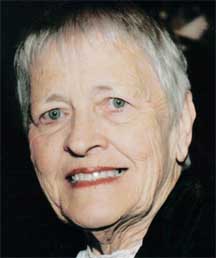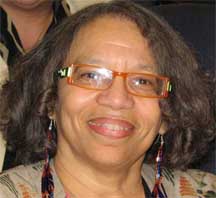Sixty-one-year-old Lucille Posey has never owned a house but the Atlanta, USA grandmother would soon know what it feels like to be a home owner when she moves into her spanking new three-bedroom quarters, compliments of Atlanta Habitat for Humanity.
“I have waited a long time for this, I am blessed,” a beaming Posey told Stabroek News last week during a visit to her new home.
The house was in its final stages of completion and the mother of two said she planned to move in by the end of this month. She has two children but they both have their own homes and she will live with her 10-year-old grandson.

“I have lived in a home before but never owned a house,” the woman explained.
The US$500 she is expected to pay each month is a sum she can afford she said with a short laugh.
Larrie Del Martin, President and Chief Executive Officer (CEO) of Atlanta Habitat, explained to a group of visiting Caribbean journalists that most of the beneficiaries of the homes would have lived in apartments, but never a house.
Martin said the homes built–most through sponsorships–are not gifts but loans to the families who benefit and they are required to repay this but with no interest to the sum of US$100,000 which is what the houses cost.
One of the sponsors is the Atlanta Women’s Build which is headed by Geneva Hall-Shelton who said that they build at one house a year for a family.
Their homes are built by all-women teams which raise the funds to sponsor a Habitat home for a working mother and her family. The homes are built in seven days–one weekend a week for seven weeks–and the beneficiaries also pitch in with labour. Eighty-five percent of Atlanta Habitat home owners are women who share the American dream of owning a home. The beneficiaries are those who would not qualify for a bank loan.

Martin said Atlanta Habitat builds about 25 homes a year, often building communities as the organization tries to get more than one piece of land in one area or street as it is hoped that the home beneficiaries will help to contribute positively to their communities.
The homeowners are also given classes on how to take care of their homes and US$25 out of the $500 paid each month is put into a savings account for the homeowner.
Starved
But while Atlanta Habitat is working to empower women by helping them to own homes in the state of Georgia, a commission set up to assist women is being starved of funds because of its closeness to President Barack Obama. Georgia is controlled by Republicans and even though the Georgia Commission on Women is a statutory commission it has not been receiving funds. The commission’s Executive Director Jessica Jones sadly told the Caribbean journalists that she has been forced to resign because the commission can no longer pay her. The situation is so bad that Jones cannot even have health insurance and she said while she will continue to assist the commission–one she has been volunteering with since her high school days–she has to earn a living.
The commission’s chair, 81-year-old Nellie D Duke, a feisty senior citizen, said the commission would not allow obstacles to stand in its way.
“We are not well funded,” she sadly admitted, but added that the commission will continue to support Obama and women will speak at the next US elections.
“Women are not going to sit down, they are going to hear about it at the elections,” she warned.
She said she is incensed and the women of Georgia and all around America “are not going to allow it.”
The commission has a 15-member board–all of whom volunteer their services as there is no money to pay them–and its main mission is to empower women in the state, including teaching them self defence tactics. The commission holds sessions around the state where persons are allowed to air their grievances and according to Duke the number one issue is lack of access to health care followed closely by violence of all kinds. Abuse of elders is also a growing issue as according to Duke “older people are not being treated well”. She said domestic violence is everywhere around the world.
“If we [women] were empowered then all the wars would stop and the famines would end and the world would be perfect,” a smiling Duke said as her husband of 63 years looked on.
The commission was established by an Act of the Georgia Legislature in 1992 to look at the laws of Georgia and their impact on women, to make recommendations to the Governor, Lt. Governor, the Legislature and the US Congress. The Commission is also to study issues of concern to women and families, to encourage and inform Georgia women, to hold conferences and public hearings.
Free thinking
Meanwhile, women of colour who attend the famous Spelman College in Atlanta are being empowered as free thinkers and they are the ones according to Dr Beverly Guy-Sheftall who go on to “change the world.”
The college has produced some of the more radical thinking black women who have not allowed themselves to be confined to any area but seek to change the course of any issue that may affect them.
Speaking to the journalists in the Cosby Academic Centre–a gift from actor Bill Cosby and his family–Dr Guy-Sheftall and other academics at the college explained that violence against women is one issue of concern for the college. It is such an issue that a domestic violence course was created in 1997 in response to a grant received through the Clinton Foundation.
The course was described as a “service learning” one and the students are mandated to have stints at various agencies that focus on women issues.
While the college is for women of colour, Guy-Sheftall noted that domestic violence does not respect race, gender or class.
Spelman College is historically a black college and those than run it describe it as a “global leader in the education of women of African descent”. The college is dedicated to academic excellence in the liberal arts and sciences and the intellectual, creative, ethical, and leadership development of its students.
“Spelman empowers the whole person to engage the many cultures of the world and inspires a commitment to positive social change,” according to the college’s website.
It was funded by two white female Baptist missionaries from England–Sophia B Packard and Harriet E Giles—in 1881 and was first called the Atlanta Baptist Female Seminary.





